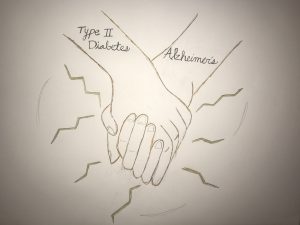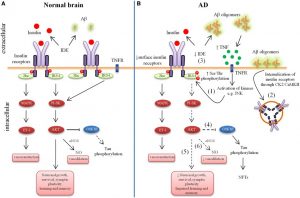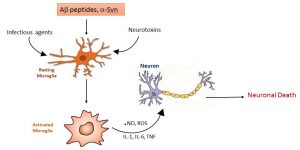
The Relationship:
When considering an individual suffering from Alzheimer’s Disease (AD), one doesn’t often associate Type II Diabetes (T2D), or vice versa. However, this may become the new norm as studies are now showing a link between these two diseases. When you take a closer look, many similarities exist, turning this relationship toxic.
What is Alzheimer’s:
Alzheimer’s is a neurodegenerative disorder characterized by progressive mental deterioration due in part to the buildup of amyloid plaques and neurofibrillary tangles in the brain. This type of dementia is the most common worldwide, causing problems with memory, thinking, and behavior. There is no treatment currently capable of reversing, stopping, or significantly slowing down the progression of this disease, making the study of its origination crucial to future treatment.
 http://az616578.vo.msecmd.net/files/2016/04/10/635958482997470921934663329_alzheimers1.jpg
http://az616578.vo.msecmd.net/files/2016/04/10/635958482997470921934663329_alzheimers1.jpg
What is Type II Diabetes:
Type II Diabetes, or noninsulin-dependent diabetes, is a disease that affects the way that the body metabolizes sugar. This disease is characterized by high blood sugar, insulin resistance, and relative lack of insulin. T2D primarily occurs as a result of obesity and lack of exercise and is seen to be becoming far more prevalent in recent years, likely due the poor diet and lifestyle exhibited by the American society.

The Connection:
Insulin, as we know, plays a large role in the body as a regulator of blood glucose. However, it also has an important role in brain function. Insulin is now understood to play a large part in neuroplasticity, neuromodulation, as well as memory and cognition. Lack of insulin function, as characterized by T2D, can disrupt these pathways, leading to common symptoms seen in Alzheimer’s disease.
Insulin function has been found to be disrupted by prolonged inflammation in the brain as seen in both T2D and AD. In individuals experiencing T2D, the accumulation of fat causes the accumulation of inflammatory molecules. It is likely that obesity associated systemic inflammation causes excesses circulating free fatty acids. These circulating cytokines, free fatty acids, and immune cells reach the brain and initiate local inflammation, including microglial proliferation. This chronic inflammation not only disrupts the insulin pathway in the brain, but also causes synaptic remodeling and degeneration through the overactivation of microglia.
In Alzheimer’s, prolonged inflammation of the brain is a characterizing factor of the disease. This chronic inflammation is largely due to the overactivation of microglia, as seen in T2D. Microglia work to degenerate the buildup of amyloid plaques commonly found in the brain of individuals suffering from Alzheimer’s. When these macrophage-like molecules can’t keep up, they continue to release pro-inflammatory cytokines in response, often damaging neurons and synapses in close proximity. This leads to neurodegeneration. Inflammation itself, such as from T2D, can also trigger the activation of microglia as they both respond to, and cause, neuroinflammation.

Importance:
Though there is no cure for Alzheimer’s, we have found that due to its strong link to T2D, diet may play a role in in alleviating the onset and progression of this neurodegenerative disease. It is important for not only your physical heath, but also future neurological heath, to be cautious of the food you put into your body as it may have a long-term effect.
For those of us who have experienced the terrors of watching a loved one suffer through the horrors of AD, we know the impacts that this knowledge could have. Alzheimer’s is not only detrimental for the individual, but also significantly traumatic for the family as well. Though it is easy to say, “that won’t happen to me” or “I’ll deal with that when I get there”, it may be vastly beneficial to both you and your loved ones to be aware and proactive as it could affect your future and quality of life.
Bibliography:
https://www.sciencedirect.com/science/article/pii/S0889159114000889
https://www.ncbi.nlm.nih.gov/pmc/articles/PMC4237995/
https://en.wikipedia.org/wiki/Diabetes_mellitus_type_2
https://moodle.cord.edu/pluginfile.php/723477/mod_resource/content/0/2018%20AD%20and%20insulin%20signaling.pdf